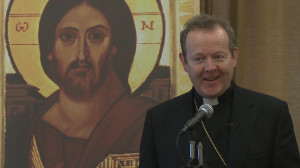
By Sarah Mac Donald - 06 December, 2015
 The Primate of All Ireland has issued a special pastoral letter to the faithful in the Archdiocese of Armagh for the Year of Mercy.
The Primate of All Ireland has issued a special pastoral letter to the faithful in the Archdiocese of Armagh for the Year of Mercy.
In it, Archbishop Eamon Martin announces he will be opening two Holy Doors on 13 December, one in St Patrick’s Cathedral in Armagh and the other in St Peter’s Church in Drogheda, home of the national shrine to St Oliver Plunkett.
These two Holy Doors will be sealed again on 13 November 2016, one week before the close of the Holy Year.
In his pastoral letter, the Archbishop extends a two-fold invitation to all to come on pilgrimage to the Holy Doors at Armagh and Drogheda; and to enter fully with their families and parishes into the spirit of the Jubilee Year.
“Pope Francis has described the Holy Year of Mercy as an ‘extraordinary moment of grace and spiritual renewal’. I pray that anyone who enters through the Holy Doors in our diocese will experience, in a profound way, the love of God who consoles, pardons and instils hope,” Archbishop Martin writes.
The Primate also sets out some practical suggestions for what people can do in the Year of Mercy. These include receiving the Sacrament of Reconciliation as well as undertaking the spiritual exercises for the indulgence associated with the pilgrimage to the Holy Doors.
“We all know ways in which we could be more open to God’s mercy in our lives – perhaps by turning away from selfishness and sinful habits. We also recognise ways of being more merciful towards others – with someone who has hurt us, or with those less fortunate than us who cry out for the love of Christ. By crossing the threshold of the Holy Doors, may we all find the strength to embrace God’s mercy in our own lives as well as becoming more merciful people ourselves.”
 He reminds the faithful that the theme of the Year of Mercy is ‘Merciful like the Father‘ and that we are all called on to show mercy because mercy has, first of all, been shown to us.
He reminds the faithful that the theme of the Year of Mercy is ‘Merciful like the Father‘ and that we are all called on to show mercy because mercy has, first of all, been shown to us.
“I encourage everyone to learn about the corporal and spiritual works of mercy and to put these into action in daily life,” he suggests.
The corporal works of mercy are: to feed the hungry, give drink to the thirsty, clothe the naked, welcome the stranger, heal the sick, visit the imprisoned, and bury the dead.
The spiritual works of mercy are: to counsel the doubtful, instruct the ignorant, admonish sinners, comfort the afflicted, forgive offences, bear patiently those who do us ill, and pray for the living and the dead.
“We all know people whose lives are inspired by the corporal and spiritual works of mercy. These works of mercy are found, above all, in the life and teaching of Jesus.”
“They are the criteria upon which we will be judged: whether or not we have relieved poverty, hunger, homelessness and thirst of those around us; whether or not we have reached out to those experiencing isolation, persecution and loneliness, despair or hopelessness; whether or not we have accompanied those who have fallen away from God and gently dispelled their ignorance, doubt or sinful ways; whether or not we are playing our part in bringing the joy of the Gospel into our world and inviting others to come to know Jesus in their lives.”
Archbishop Martin emphasises that the Door of Mercy opens both inwards and outwards.
The Year of Mercy challenges us to go out and bring the wonderful invitation to mercy to all God’s people, he states.
Recalling the recent Synod on the Family, he said the participants had spoken about the importance of ‘accompanying’ those who may have lapsed from practising their faith, and those who may feel excluded from the Church community.
“We emphasised that the Church must start “from the real life situations of present day families, all in need of mercy, beginning with those who suffer most.”
Dr Martin encourages every priest and parish pastoral council to consider practical ways of drawing as many people as possible into the grace of this moment.
By participating in liturgies and events, and providing opportunities for faith development and pilgrimage, we can make the Year of Mercy more meaningful in our lives and in the life of the Church, he said.
The Archbishop suggests that families might also consider visiting the national pilgrimage centres of Knock, Lough Derg and Croagh Patrick.
The Primate himself will travel with pilgrims from the diocese of Armagh to Rome in June 2016 to visit the seven Churches mentioned by St Oliver Plunkett in his writings.
Another suggestions proposed by a priest in the Archdiocese of Armagh for the Year of Mercy is that people would say the ‘Jesus prayer‘, which is, ‘Jesus, Son of the Living God, have mercy on me, a sinner’.
“If we recite the prayer over and over again then every moment of every day, every thought, word and action in the Archdiocese could be touched by God’s mercy. The Archdiocese of Armagh would then become an ‘oasis of mercy’,” Archbishop Martin suggests.
“Jesus is the Door of Mercy. Jesus is the face of God, the Father’s mercy. The Jesus Prayer says it all and we could pray it with humility and confidence thousands of times during the Jubilee Year,” he concludes.